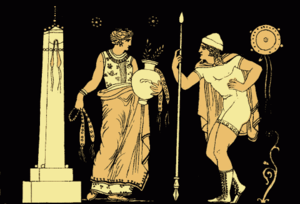Electra: Difference between revisions
No edit summary |
|||
| Line 12: | Line 12: | ||
== Overview == |
== Overview == |
||
===The Murder of Agamemnon=== |
|||
| ⚫ | |||
| ⚫ | Electra was absent from [[Mycenae]] when her father, King Agamemnon, returned from the [[Trojan War]] to be murdered by [[Aegisthus]], Clytemnestra's lover, and/or by Clytemnestra herself. Aegisthus and Clytemnestra also killed [[Cassandra]], Agamemnon's war prize, a prophet priestess of Troy. Eight years later Electra was brought from [[Athens]] with her brother, [[Orestes (mythology)|Orestes]]. (''[[Odyssey]]'', iii. 306; X. 542). |
||
According to [[Pindar]] (''Pythia'', xi. 25), Orestes was saved by his old nurse or by Electra, and was taken to [[Phanote]] on [[Mount Parnassus]], where King [[Strophius]] took charge of him. In his twentieth year, Orestes was ordered by the [[Delphi]]c [[oracle]] to return home and avenge his father's death. |
According to [[Pindar]] (''Pythia'', xi. 25), Orestes was saved by his old nurse or by Electra, and was taken to [[Phanote]] on [[Mount Parnassus]], where King [[Strophius]] took charge of him. In his twentieth year, Orestes was ordered by the [[Delphi]]c [[oracle]] to return home and avenge his father's death. |
||
Revision as of 22:41, 2 March 2009

In Greek mythology, Electra (Greek: Ηλέκτρα) was an Argosian princess and daughter of King Agamemnon and Queen Clytemnestra, and was a sibling to sisters Iphigeneia, Chrysothemis, and brother Orestes.
She is the main character in the Greek tragedies Electra by Sophocles and Electra by Euripides and has inspired various other works.
The psychological concept of the Electra complex is named after her.
Overview
The Murder of Agamemnon
Electra was absent from Mycenae when her father, King Agamemnon, returned from the Trojan War to be murdered by Aegisthus, Clytemnestra's lover, and/or by Clytemnestra herself. Aegisthus and Clytemnestra also killed Cassandra, Agamemnon's war prize, a prophet priestess of Troy. Eight years later Electra was brought from Athens with her brother, Orestes. (Odyssey, iii. 306; X. 542).
According to Pindar (Pythia, xi. 25), Orestes was saved by his old nurse or by Electra, and was taken to Phanote on Mount Parnassus, where King Strophius took charge of him. In his twentieth year, Orestes was ordered by the Delphic oracle to return home and avenge his father's death.

The Murder of Clytemnestra
According to Aeschylus, Orestes met her face before the tomb of Agamemnon, where both had gone to perform rites to the dead; a recognition took place, and they arranged how Orestes should accomplish his revenge. Pylades and Orestes killed Clytemnestra and Aegisthus (in some accounts with Electra helping).
Before her death, Clytemnestra curses Orestes and the furies come to torment him. He was pursued by the Erinyes, or Furies, whose duty it is to punish any violation of the ties of family piety. Electra, however, was not hounded by the Erinyes. Orestes took refuge in the temple at Delphi. When he went to the temple it is said a priestess found him first, covered in blood and with the furies flying all around him (Orestes). After, they washed him with pigs blood to purify him. Once purified he traveled to Athens to seek Athena.
At last Athena (also known as Areia) received him on the Acropolis of Athens and arranged a formal trial of the case before twelve Attic judges. The Erinyes demanded their victim; he pleaded the orders of Apollo; the votes of the judges were equally divided, and Athena gave her casting vote for acquittal.
In Iphigeneia in Tauris, Euripides tells the tale somewhat differently. He claims that Orestes was led by the Furies to Tauris on the Black Sea, where his sister Iphigeneia was being held. The two met when Orestes and Pylades were brought to Iphigeneia to be prepared for sacrifice to Artemis. Iphigeneia, Orestes, and Pylades escaped from Tauris. The Furies appeased by the reunion of the family, abated their persecution.
Marriage
Later, Pylades and Electra fell in love and married. Pylades was the son of King Strophius (who had cared for Orestes while he hid from his mother and her lover), and had helped Orestes and Electra kill Clytemnestra and Aegisthus.
According to Euripides, Clytemnestra and Aegisthus had previously given Electra in marriage to a peasant, believing that her children would be less likely to take revenge if they were not of noble birth, but the peasant respected her and declined to consummate the marriage.

Adaptations of the Electra story
Plays
- The Oresteia, a trilogy of plays by Aeschylus
- Electra, play by Sophocles
- Electra, play by Euripides
- Electra, play by Jean Giraudoux
- Electra, drama by Danilo Kiš
- The Flies, a play by Jean-Paul Sartre, modernizing the Electra myth around the theme of existentialism.
- Elektra, a play by Hugo von Hofmannsthal, based on the Sophocles play.
- Mourning Becomes Electra, play by Eugene O'Neill, based on Aeschylus
- Electricidad, play by Luis Alfaro, modern adaptation of Electra based in the Chicano barrio
- Infamante Electra (2005) a play by Benjamín Galemiri
- Molora (2004) a play by Yael Farber
Opera
- Elektra, by Richard Strauss, with libretto by Hugo von Hofmannsthal, based on his own play
- Elektra, by Mikis Theodorakis
- Mourning Becomes Electra, by Marvin David Levy, based on Eugene O'Neill's play
- Idomeneo, by Wolfgang Amadeus Mozart, where she plays a minor role.
Films
- Electra, film by Michael Cacoyannis, starring Irene Papas, based on Euripides.
- Ellie (movie), B-movie which transfers the story to a Southern U.S. locale.
- Szerelmem, Elektra (aka Elektra, My Love), film by Miklós Jancsó, starring Mari Törőcsik.
- Filha da Mãe, and Mal Nascida, both by portuguese film director João Canijo.
Music
- La tragédie d'Oreste et Électre, an album based on Sartre's The Flies by the british band Cranes.
